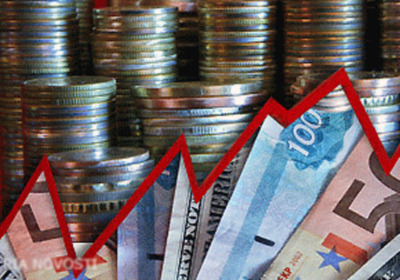Russia Nears End of Recession as GDP Shrinks Less Than Forecast

(Bloomberg – bloomberg.com – Olga Tanas – February 1, 2017)
Russia edged closer to exiting its longest recession in almost two decades as mining, manufacturing and agriculture added to stabilizing oil prices to steady the economy of the world’s biggest energy exporter.
Gross domestic product contracted 0.2 percent last year after an upwardly revised decline of 2.8 percent in 2015, the Federal Statistics Service said on Wednesday. That result, the first reading for 2016, beat every forecast in a Bloomberg survey of 15 analysts, whose median estimate was for a 0.5 percent drop. The Economy Ministry had projected a decrease of 0.6 percent.
Rising exports and rebuilding of stocks were key drivers in 2016, said Nikolay Kondrashov, an analyst at the Development Center of the Higher School of Economics. “Both investment and consumption declined, but the impact of inventories was very strong,” he said.
Manufacturing grew 1.4 percent in 2016, according to the latest report, while production of oil, gas and other natural resources was up 0.2 percent. Agriculture, buoyed by restrictions on imports and the ruble devaluation, grew 3.5 percent. Consumers continued to struggle, with wholesale and retail trade down 3.6 percent. Construction was off 4.3 percent.
“The data confirmed that industry has driven the recovery, while consumer-facing sectors remain weak,” Capital Economics said in an e-mailed note, adding that positive growth may have returned in the fourth quarter, although those data aren’t available yet.
Recessions in 1998 and 2009 were shorter and deeper, setting the stage for sharp rebounds. Russia is now at risk of muted growth after low oil prices pummeled public finances and battered consumer demand, forcing the central bank to allow the ruble to trade freely.
“Monetary easing, which continued in June 2016 and which ‘bites’ with a lag, helped manufacturing and agriculture to some extent,” said Vladimir Miklashevsky, senior strategist at Danske Bank A/S in Helsinki.
President Vladimir Putin said at a meeting with the government last month that some of the positive trends in the economy in 2016 aren’t steady yet and authorities need to find new sources of stimulus. While the government estimates GDP will grow 0.6 percent this year, higher oil prices may help boost expansion.
“We can expect growth of 1-1.5 percent and maybe even 2 percent if things go well” this year, First Deputy Prime Minister Igor Shuvalov said in an interview last month.
Article ©2017 Bloomberg L.P. All Rights Reserved. Article also appeared at bloomberg.com/news/articles/2017-02-01/russia-nears-end-of-recession-as-gdp-shrinks-less-than-forecast
